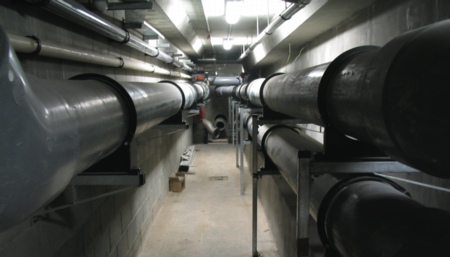FAQs on plastic pipework systems

Des Dolan answers the most frequently asked questions regarding plastic pipework systems
Although plastic pipework systems have been in existence for over 50 years, they are still considered as a new product by many in the building-services industry. Consequently, manufacturers of plastic pipework constantly receive enquiries about the installation, performance and effects of plastic pipework systems. Here are the most frequently asked questions that are received by Durapipe’s in-house technical-support department relating to the use of plastic pipework systems in the building-services industry.
Q How can we accommodate changes in length due to thermal expansion?
A It is usually possible to accommodate thermal movement utilising the natural flexibility of the pipework at changes in direction. If there are insufficient changes in direction, we would advise the inclusion of expansion loops. Alternatively it may be possible to utilise flexible hoses or bellows.
Q What is the lowest/highest ambient temperature at which I can successfully make solvent weld joints?
A Temperature is not critical to make solvent weld joints as long as the surfaces that need to be joined are kept clean and dry. However, for below-zero temperatures additional curing time should always be allowed as the evaporation rate of the solvent will be slower. At higher ambient temperatures cement should be applied briskly because it dries faster during application.
Q Can trace heating be used with plastic piping?
A Yes, plastic pipes can be equipped with trace-heating systems to prevent the pipes from freezing. Reputable tape suppliers should be able to offer suitable tapes and installation advice such as putting an aluminium/foil barrier between the pipe and the trace-heating tape. The surface temperature of the heating strips must not exceed 70°C. All trace-heating systems should comply with BS 6351 — specification for electric surface heating devices. For more specific advice refer to the manufacturer.
Q Does plastic pipework need insulating?
A As a general rule, if you would insulate a copper or steel pipe then you should also insulate a plastic pipe. However, plastic has a lower rate of thermal conductivity meaning that a reduced insulation thickness may be possible for plastic pipework. However, as most insulation is purchased in a standard thickness, it means that the overall result will be energy saving on hot-water systems.
Q Why does scale build up in copper pipes but not in plastic?

A This is down to the surface roughness. The internal surface of copper pipes has tiny spikes onto which scale clings, and further scale then clings to that scale. In comparison, the surface of a plastic pipe is smooth so there is nothing for the scale to cling to.
Q Does plastic give off toxic gases when it burns?
A Some plastic pipework systems can give off trace amounts, but this would never be enough to be classed as hazardous in the event of a fire. As with many flammable materials the primary hazard is smoke.
Q How impact resistant is plastic pipework compared with metal pipework?
A This will vary according to the material of construction but generally plastic solutions are very robust systems, particularly Durapipe SuperFLO, which is a very tough material, even at low temperatures of -40°C.
Q Is plastic pipework quicker to install than metal alternatives?
A Yes, it has been proven that installation time can be cut by up to 40% by utilising plastic pipework systems. Plastic systems are about one sixth the weight of steel pipes, so they are much easier to handle manually on site and require no heavy lifting equipment.
The other major area in which time is significantly reduced is the jointing process. Modern solvent cements, which are used with many plastic systems, have reduced the amount of pipe preparation required and offer quicker drying times.
Des Dolan is brand manager with Durapipe UK







